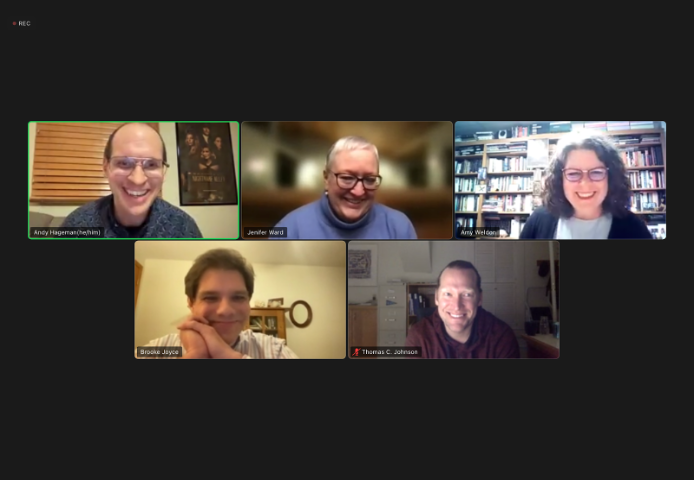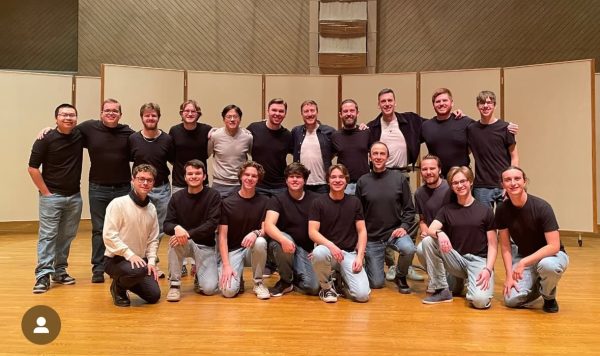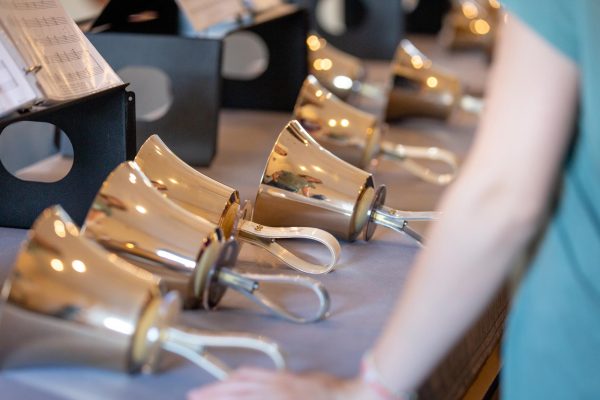Center for Ethics and Public Engagement presents Nosferatu@100
Final exams, a piece of paper tucked under the windshield wiper of your car, and things that go bump in the night–these are all phenomena known to strike fear into the hearts of college students nationwide. While tests and parking tickets don’t frequently appear in horror movies on the big screen, vampires do. For the Zoom roundtable discussion Thursday night, F.W. Murnau’s 1922 silent film Nosferatu certainly fit the bill.
On March 10, the Center for Ethics and Public Engagement (CEPE) held Nosferatu@100, a panel organized by CEPE Director and Associate Professor of English Andy Hageman. The panel consisted of President Jenifer K. Ward, Professor of English Amy Weldon, Associate Professor of Communication Studies Thomas Johnson, and Professor of Music and Composer in Residence Brooke Joyce. For an hour, the panelists discussed and explored an interdisciplinary approach to Nosferatu.
The panel began with a five-minute introduction to the film given by Hageman, followed by five-minute presentations from each panelist that related aspects of the film to their departments and areas of study. The final twenty minutes consisted of open discussion among the panelists. In planning the panel, Hageman chose to not have the participants communicate about what they were presenting.
“I purposefully planned the panel so that we did not communicate with each other about what we would present,” Hageman said. “If you invite people to think about a shared text and bring their expertise, the fun work and also the productive work happens in how do we build something out of what we’re all bringing to it.”
An unauthorized and unofficial film adaptation of Bram Stoker’s 1897 novel Dracula, Nosferatu follows the story of Thomas Hutter (Gustav von Wangenheim), a man who travels to Transylvania to sell a house to the vampire Count Orlok (Max Schrek). With him, Orlok brings a plague that sweeps through the fictional German town of Wisborg, as well as a classic battle of good versus evil.
Regarded as the first widely known vampire film, Nosferatu is still speaking to audiences 100 years after its debut. A notable cinematic response to the horrors of World War I and the 1918 influenza pandemic, its relevance recently revived. It remains relevant not only for its historical context and influence on the horror genre, but also for its contemporary connections to the COVID-19 pandemic and Russia’s recent invasion of Ukraine.
Such connections led viewers and panelists to grapple with the prescience of the film and the patterns of our world. In discussing these connections and the notion of history repeating itself, Hageman pointed to the world-systems theory.
“There’s a theory called world-systems theory, that if you had to visualize it, it’s sort of like maybe an upward spiral,” Hageman said. “We kind of see the same things every once in a while. We come back to that point on the circle, but we’ve moved somewhere else, and so other things are different even as we come back.”
The panel began with a five-minute introduction to the film given by Hageman, followed by five-minute presentations from each panelist that related aspects of the film to their departments and areas of study. The final twenty minutes consisted of open discussion among the panelists. In planning the panel, Hageman chose to not have the participants communicate about what they were presenting.
“I purposefully planned the panel so that we did not communicate with each other about what we would present,” Hageman said. “If you invite people to think about a shared text and bring their expertise, the fun work and also the productive work happens in how do we build something out of what we’re all bringing to it.”
This type of collaborative conversation is one of the focuses Hageman has been working on since becoming the Director of the CEPE in December 2021. The CEPE’s goals include extending conversation beyond the classroom and celebrating the liberal arts. One of the ways that was manifested in this roundtable was the many different views and connections to the source material that the panelists brought with them.
Prior to the panel, Dr. Weldon had just finished teaching a J-term course entitled “English Monsters.” The course was intended to happen in the U.K., but was reformatted and held on campus this year. Weldon was able to bring this knowledge and expertise to the discussion. In explaining what she took away from the roundtable experience, Weldon pointed to the crossovers that happened between the diverse fields of study represented in the roundtable and the very topics she discussed in her class.
“That course focused on a lot of the same issues and kind of notes that we sounded on in the panel last night,” Weldon said. “What makes the monster frightening? What does the monster say about the society the monster arises from? I was really really happy to be on the panel and happy to just be with colleagues talking about ideas. Here’s interesting folks together, talking about a text at a pretty high level.”
Complementary to the expertise brought by the other panelists, Dr. Brooke Joyce has experience in creating and teaching how to create soundtracks for silent films. As Composer in Residence, Joyce takes on a silent film project with his students about every four years. In 2010, the film project was Nosferatu.
“I was invited by Professor Andy Hageman, as he remembered the silent film project undertaken by the composition studio in 2010,” Joyce said. “The project mostly unfolded as expected, though, in retrospect, it was a tall order to have musicians concentrate for 90 minutes without a break.”
In summarizing what he hopes viewers took away from Nosferatu@100, Hageman points to becoming an analytical media consumer. An example of such consumption is the discussion the panelists engaged in.
“I hope people come away from that event maybe feeling a little better equipped to go into any movie today and be a little bit more of an analytical consumer,” Hageman said. “We were all modeling that [during the discussion], and I’m hoping that that modeling teaches or equips people to do that themselves.”
In the near future, the CEPE plans to hold a book group and discussion in April about the collection of Chinese science fiction and fantasy short stories in The Way Spring Arrives and Other Stories, edited and collected by Yu Chen and Regina Kanyu Wang. More information will appear in the Luther College Bulletin in the coming weeks.






